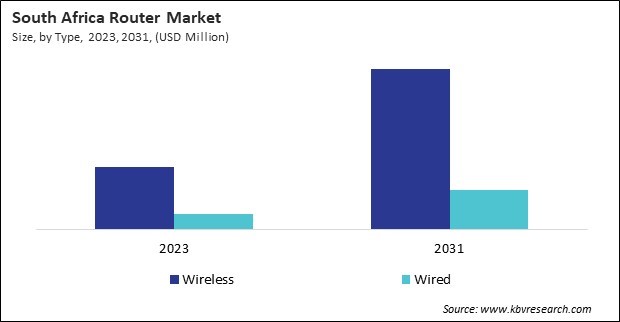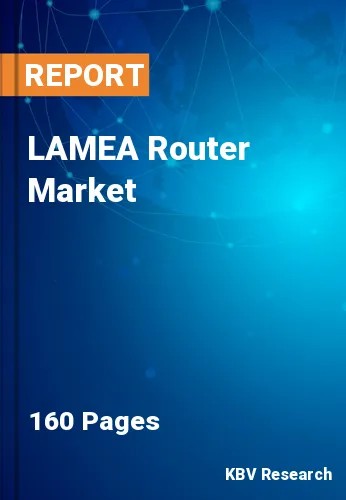The Latin America, Middle East and Africa Router Market would witness market growth of 13.1% CAGR during the forecast period (2024-2031). In the year 2027, the LAMEA market's volume is expected to surge to 24,558.4 thousand units, showcasing a growth of 11.1% (2024-2031).
The education sector relies on routers to support e-learning platforms, online classes, and virtual collaboration tools. With the growing shift toward digital education, routers provide the high-speed internet connectivity needed for smooth video streaming, online assessments, and cloud-based learning. Advanced routers enable educational institutions to manage multiple devices simultaneously, ensuring that students and teachers can access digital resources without interruptions. Thus, the Saudi Arabia market is expected to Utilize 624.7 thousand units of Routers in education sector by the year 2031.

The Brazil market dominated the LAMEA Router Market by Country in 2023, and would continue to be a dominant market till 2031; thereby, achieving a market value of $1,105.8 million by 2031. The Argentina market is showcasing a CAGR of 13.9% during (2024 - 2031). Additionally, The UAE market would register a CAGR of 12.7% during (2024 - 2031).
Digital transformation initiatives in businesses are pushing the adoption of more sophisticated networking solutions, including high-performance routers. Enterprises increasingly rely on cloud services, virtual collaboration tools, and remote work solutions, requiring high-speed, reliable routers to ensure optimal performance. The shift toward hybrid work environments and the need for robust enterprise security further accelerate router adoption.
Moreover, the rollout of 5G technology is expected to boost the adoption of advanced routers. 5G networks promise faster speeds, ultra-low latency, and enhanced connectivity, which requires routers capable of handling high-speed, high-volume traffic. As industries and consumers demand faster, more reliable connectivity, routers designed to support 5G infrastructure and services are seeing growing adoption.
The Middle East, particularly Saudi Arabia and the UAE, is witnessing significant technological advancements, with notable growth in the Internet of Things (IoT) industry and the rollout of 5G networks. These developments drive the demand for robust and efficient network infrastructure, especially routers. Saudi Arabia's IoT industry is experiencing rapid growth, with the market projected to reach $2.9 billion by 2025, driven by an annual growth rate of 12.8%. This expansion primarily focuses on industrialized IoT applications, AI, cloud computing, and data centers.
Free Valuable Insights: The Worldwide Router Market is Projected to reach USD 45.39 Billion by 2031, at a CAGR of 11.4%
Based on Type, the market is segmented into Wireless (Dual, Single, and Tri) and Wired. Based on End User, the market is segmented into IT & Telecom, BFSI, Education, Healthcare, and Other End Users. Based on countries, the market is segmented into Brazil, Argentina, UAE, Saudi Arabia, South Africa, Nigeria, and Rest of LAMEA.
By Type (Volume, Thousand Units, USD Billion, 2020-2031)
By End User (Volume, Thousand Units, USD Billion, 2020-2031)
By Country (Volume, Thousand Units, USD Billion, 2020-2031)
Our team of dedicated experts can provide you with attractive expansion opportunities for your business.

